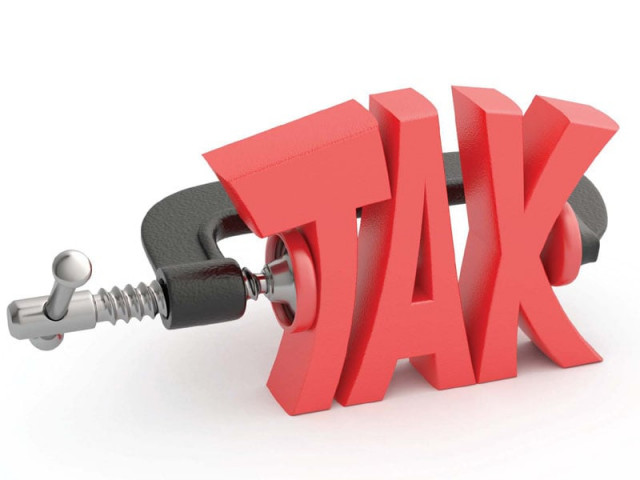In a tight spot: Tax amnesty plan back on the table
PM Khoso given a hard choice between relief for tax cheats and greater burden on honest taxpayers.

The need to levy new taxes has arisen in the ninth month of the ongoing fiscal year. DESIGN: FAIZAN DAWOOD
After Prime Minister Mir Hazar Khan Khoso assured economic managers that he will take all necessary measures to boost declining revenues, tax authorities on Friday presented him with two options. The first choice meant pushing for a controversial tax amnesty scheme through the promulgation of a presidential ordinance; the second, levying new taxes to raise Rs120 billion.
“One of these two options will be picked next week,” an official from the Federal Board of Revenue (FBR) told The Express Tribune after briefing the premier.
FBR officials said that despite the outgoing National Assembly’s refusal to pass the Tax Amnesty Bill, the scheme is still the first option for tax authorities. Under the scheme, the FBR will give what it has called a ‘once in a lifetime opportunity’ to three million identified tax evaders: pay a nominal tax of Rs40-70,000 and come into the tax net. Defiance carries severe penalties, like the suspension of Computerised National Identity Cards for commercial transactions, and a ban on air travel. The FBR chairman has often described the data on these identified tax evaders as a “goldmine”.

If the caretaker government decides against the amnesty scheme, the FBR will propose the levy of an additional Rs110 billion to Rs120 billion in new taxes, which will burden existing taxpayers, the officials added. These proposals have already been discussed with the International Monetary Fund (IMF). The FBR has recently withdrawn the zero-rating facility from the textile sector, and intends to withdraw this facility from three more protected sectors under proposed revenue measures.
Earlier, the finance ministry had told the premier that he had to take tough decisions or be ready to resort to the IMF for help in stabilising the staggering economy.
The need to levy new taxes has arisen in the ninth month of the ongoing fiscal year due to a widening gap between the budgeted Rs2.381 trillion annual revenue generation target and actual collections. So far this year, the FBR has collected Rs1.29 trillion, which is merely 54% of the original annual revenue collection target.
“We put everything on the table. Now it is up to the government to decide which option it will go with,” the official said. He added that the premier was told that the FBR could at best collect only Rs2.058 trillion for the entire year if nothing was done to address the situation.

That estimate is a staggering Rs323 billion less than the original collection target approved by the Parliament in June 2012 for the ongoing fiscal year. It is Rs135 billion below even the revised target of Rs2.193 trillion, which the outgoing federal cabinet approved early this month. The estimated shortfall will widen the national budget deficit by 1.4% of Gross Domestic Product, increasing chances of yet another historical budget deficit.
“The revenue collected by FBR so far warrants immediate attention, and necessary measures need to be taken to meet targets,” observed PM Khoso, according to a handout issued by his secretariat. The prime minister has sought proposals and recommendations for augmenting revenue collection for the approval of the government within the next three to four days, it further stated.
FBR Chairman Ali Arshad Hakeem has informed the prime minister that the FBR is experiencing difficulties in achieving tax targets due to the narrow tax base, a fall in imports, and the general situation in the country.
The premier said the need for finances cannot be overemphasised, and has directed the FBR to make all efforts to achieve targeted collection.
The FBR’s performance has been marred by political appointments to key posts, tax breaks to influential lobbies extended by the former regime, and a slowdown in economic activities in the country due to the government’s inability to resolve the energy crisis and do away with rampant corruption.
Published in The Express Tribune, March 30th, 2013.



















COMMENTS
Comments are moderated and generally will be posted if they are on-topic and not abusive.
For more information, please see our Comments FAQ